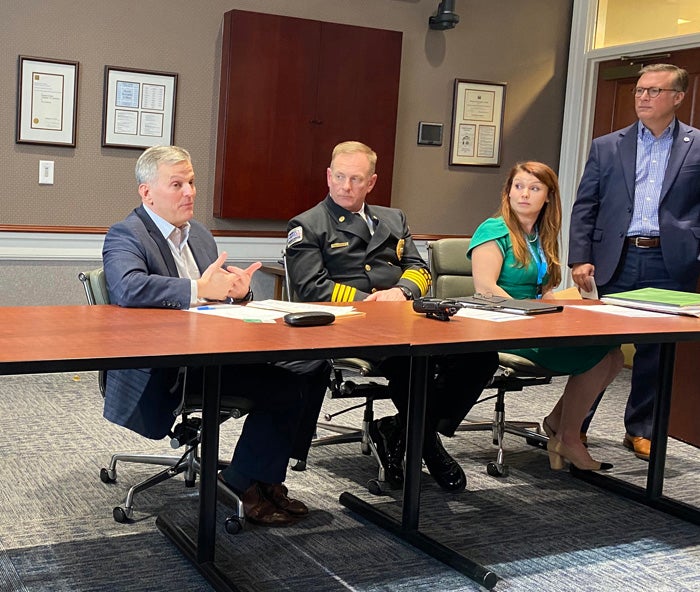Rowan County’s opioid overdoses up, but fatalities down
Published 12:08 am Sunday, February 12, 2023

- North Carolina Attorney General Josh Stein, left, speaks Thursday on the $15 million Rowan County received as part of the national opioid settlement with Rowan County EMS Chief Brian Edwards, Public Health Director Alyssa Harris and County Commissioner Greg Edds. Charlie Drape/Salisbury Post
SALISBURY — Even though the number of opioid overdoses in Rowan County over the past several years are up, fatalities are down, according to the Rowan County Public Health Department.
In 2022, there were 902 overdoses, up from 755 in 2021 and 626 in 2020.
When a person overdoses on opioids, it doesn’t mean they die instantly. Opioids decrease oxygen levels, so when those experiencing an overdose slowly stop breathing, it can take minutes to hours to fully stop. Most people have a window of time for help to arrive when someone can administer Narcan, a medication used to reverse or reduce the effects of opioids, before a victim dies.
Rowan County Emergency Medical Services distributed 669 doses of Narcan in 2022 compared to 628 doses in 2021 and 446 doses in 2020.
With the help of education and a larger supply of Narcan, fatalities in the county due to opioid overdoses decreased in 2022 to 36 compared to 87 in 2021 and 74 in 2020.
“We’re doing a great job at getting Narcan out there so when people do experience an overdose, they have Narcan on hand to be able to reverse it and we do a lot of education around identifying the signs of an overdose so people can quickly respond to an emergency situation,” said Courtney Meece, the health department’s community health manager.
A 2021 community health survey administered by the health department and Novant Health found 47.1% of county residents listed substance use as a top community concern, only behind crime/violence.
The health department started the HOPE Program, which stands for “Harm-Reduction, Outreach, Prevention and Education.” The program distributes Narcan, meets with clients who have experienced an overdose and gives out sterile water to reduce the risk of spreading hepatitis through shared water.
More strategies will be implemented in the coming months due to the county receiving a little over $15 million as part of the $26 billion opioid settlement from the country’s three largest drug distributors — McKesson, Cardinal Health and AmerisourceBergen — and one manufacturer, Janssen Pharmaceuticals, Inc., and its parent company Johnson & Johnson. North Carolina received $757 million from the settlement.
Local officials heard details on the settlement funds during a visit from state Attorney General Josh Stein, who came to Salisbury on Thursday to discuss the funds and strategies that will be developed to address the opioid epidemic through treatment, recovery, harm reduction and other life-saving programs and services.
The health department recently hired a substance use and mental health program manager who will be in charge of collaborative strategic planning and rolling out the strategies the department is focusing on: early intervention, Narcan distribution, post-overdose response teams and harm-reduction services. The substance use and mental health program manager will start Feb. 20.
“Through this collaborative strategic planning we’ll talk to stakeholders in the community and some of our elected officials and we’ll really be able to understand the best way to go about implementing those strategies,” Meece said. “We have a plan and an idea of what we’re going to do. We just have to iron out the details.”
The increase in opioid overdoses and fatalities has been impacting the state and nation. In 2020, overdose deaths increased by 40% in North Carolina from 2019 and jumped another 15% in 2021. Overdose deaths now outnumber those from traffic accidents.




